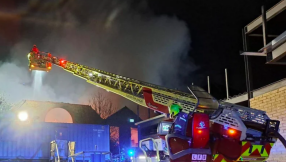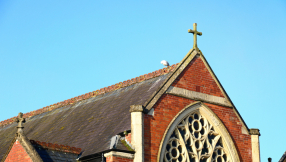A collection of senior Church figures has lamented Britain's 'broken promise' to the Palestinians exactly 100 years after the Balfour Declaration that promised both a national home for the Jews but also the protection of 'existing non-Jewish communities in Palestine'.
The Anglican Bishop of Southwark, Christopher Chessun, the Catholic Bishop of Clifton, Declan Lang, Rev Iain Cunningham, convener of the World Mission Council at the Church of Scotland, Rev Richard Frazer, the convener of the Church and Society Council at the Church of Scotland and the senior Methodist minister and peer Lord (Leslie) Griffiths of Burry Port have all put their name to the Balfour Project, aimed at redressing the balance of the Balfour Declaration. Supporters of the project held a meeting at Methodist Central Hall in Westminster last night.
Speakers at the event included Baroness Kennedy, Emily Thornberry MP (the shadow foreign secretary), Crispin Blunt MP, Dr Philippa Whitford MP, Richard Burden MP, Tom Brake MP and Layla Moran MP, plus prominent religious and academic figures.
Bishop Lang has written for Christian Today on Britain's 'broken promise' to the Palestinians.
Sir Vincent Fean, the senior diplomat who was the British Consul-General to Jerusalem (2010-14) and is one of the main organisers of the Balfour Project, told Christian Today: 'The aim of the Balfour Project is to secure equal rights for all those living between the Mediterranean Sea and the Jordan River. This need is felt particularly by Palestinian Christians as well as the Muslims who dwell in the Occupied Palestinian Territories.
'The declaration signed by British people of standing in civil society conveys our commitment to work for peace with justice enabling the people of Israel and the people of Palestine to live side by side in harmony. It was the Palestinian Christian Fr Jamal Khader who said: "In a time when religious extremism, both Jewish and Islamic, is spreading death and hatred, a just peace in the Holy Land will be a new beginning, not only for Israel/Palestine, but for the whole Middle East. It will be a message to everyone that we can live together, we can coexist on this land...The Occupation must end, and international law should be respected." The Balfour Project is working to make Fr Khader's hope a reality, by asking Western governments to act according to their conscience.'
The 1917 Balfour Declaration pledged Britain's support for a 'national home' in Palestine for the Jewish people on the understanding that the rights of 'existing non-Jewish communities in Palestine' would not be prejudiced. The Balfour Project states: 'The failure to uphold this second clause, for which Britain bears much responsibility, has caused conflict between Palestinians and Israelis ever since.
'This was just one of Britain's contradictory promises during the First World War. After the War we secured a mandate from the League of Nations which included a "sacred trust" to prepare the people of Palestine for independence. But in the end Britain walked away.
'The British Government recognises the right of both Israelis and Palestinians to self-determination. Israelis have achieved this. Now is the time to help Palestinians achieve this, in cooperation with both peoples and the rest of the international community.
'It will mean committing ourselves to work for peace with justice in the region on the basis of equal rights for both Israelis and Palestinians. It entails upholding international law, including the Geneva Conventions, without fear or favour. This is a huge, long-term challenge. Governments will only take it on if their citizens do so first. If Britain gives a lead, others will follow.
'This Centenary event is an opportunity to acknowledge Britain's legacy, consider our individual and collective responses, and make ourselves heard.'













